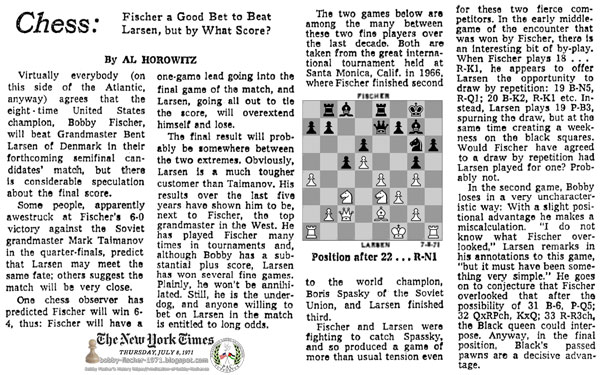New York Times, New York, New York, Thursday, July 08, 1971 - Page 32
Chess: Fischer a Good Bet to Beat Larsen, but by What Score? by Al Horowitz
Virtually everybody (on this side of the Atlantic, anyway) agrees that the eight-time United States champion, Bobby Fischer, will beat Grandmaster Bent Larsen of Denmark in their forthcoming semifinal candidates' match, but there is considerable speculation about the final score.
Some people, apparently awestruck at Fischer's 6-0 victory against the Soviet grandmaster Mark Taimanov in the quarter-finals, predict that Larsen may meet the same fate; others suggest the match will be very close.
One chess observer has predicted Fischer will win 6-4, thus: Fischer will have a one-game lead going into the final game of the match, and Larsen, going all out to tie the score, will overextend himself and lose.
The final result will probably be somewhere between the two extremes. Obviously, Larsen is a much tougher customer than Taimanov. His results over the last five years have shown him to be, next to Fischer, the top grandmaster in the West. He has played Fischer many times in tournaments and, although Bobby has a substantial plus score, Larsen has won several fine games. Plainly, he won't be annihilated. Still, he is the under-dog, and anyone willing to bet on Larsen in the match is entitled to long odds.
The two games below are among the many between these two fine players over the last decade. Both are taken from the great international tournament held at Santa Monica, Calif. in 1966, where Fischer finished second to the world champion, Boris Spassky of the Soviet Union, and Larsen finished third.
Fischer and Larsen were fighting to catch Spassky, and so produced a game of more than usual tension even for these two fierce competitors. In their early middle-game of the encounter that was won by Fischer, there is an interesting bit of by-play. When Fischer plays 18 … R-K1, he appears to offer Larsen the opportunity to draw by repetition: 19. B-N5, R-Q1; 20. B-K2, R-K1 etc. Instead, Larsen plays 19. P-B3, spurning the draw, but at the same time creating a weakness on the black squares. Would Fischer have agreed to a draw by repetition had Larsen played for one? Probably not.
In the second game, Bobby loses in a very uncharacteristic way: With a slight positional advantage he makes a miscalculation. “I do not know what Fischer overlooked,” Larsen remarks in his annotations to this game, “but it must have been something very simple.” He goes on to conjecture that Fischer overlooked that after the possibility of 31. B-6, P-Q5; 32. QxRPch, KxQ; 33. R-R3ch, the Black queen could interpose. Anyway, in the final position, Black's passed pawns are a decisive advantage.
Bent Larsen vs Robert James Fischer Second Piatigorsky Cup (1966), Santa Monica, CA USA, rd 15, Aug-10 King's Indian Defense: Averbakh. Benoni Defense Advance Variation (E75) 0-1 https://www.chessgames.com/perl/chessgame?gid=1044610























